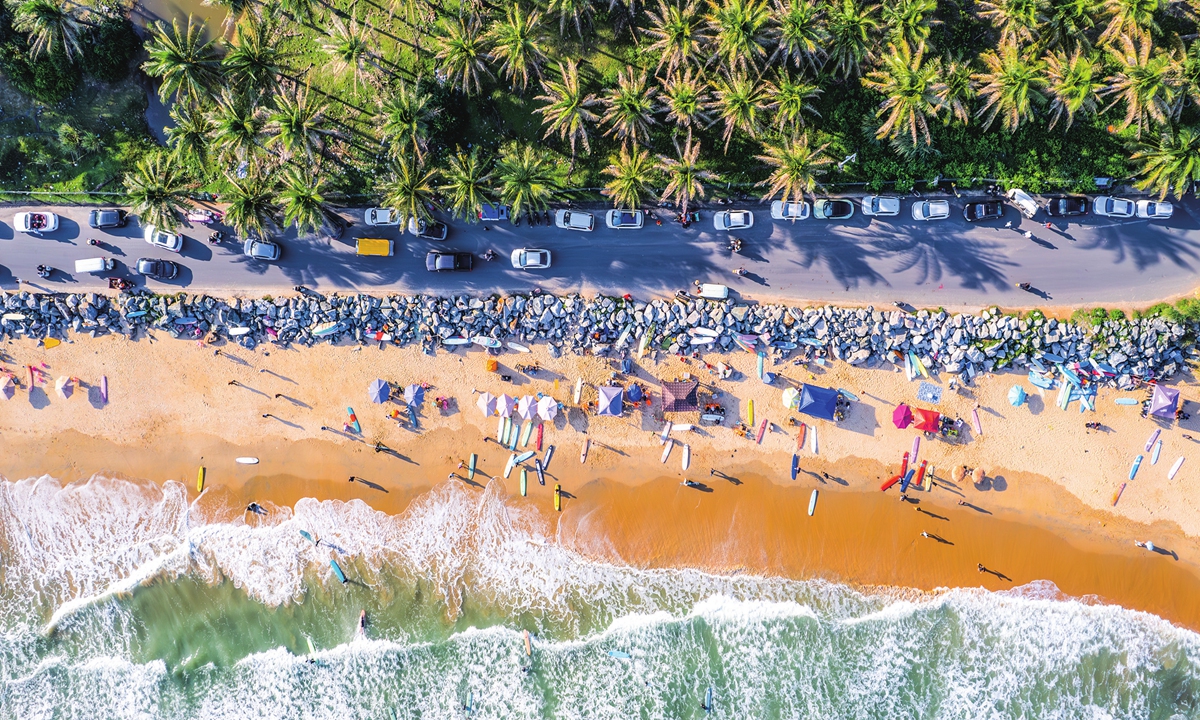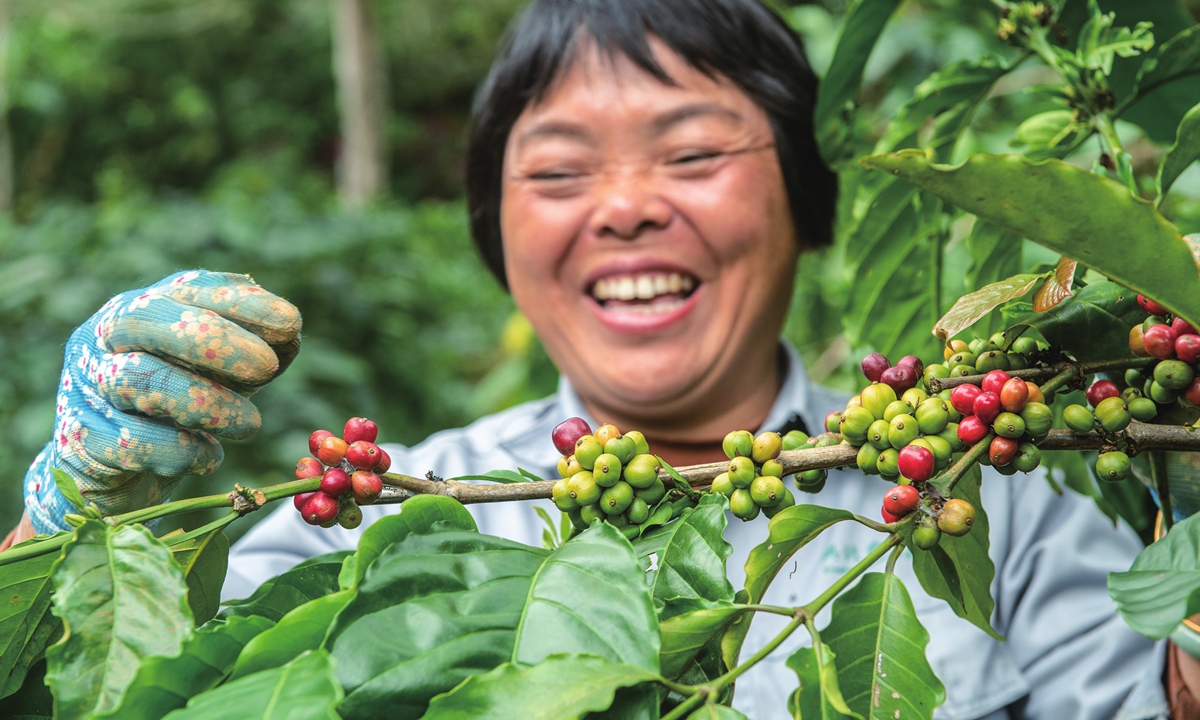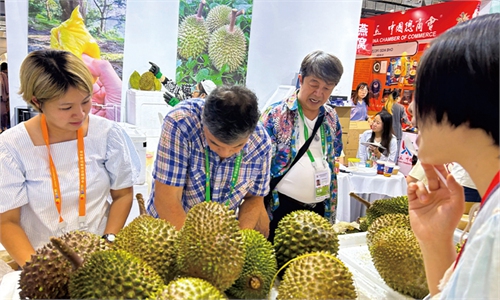ARTS / CULTURE & LEISURE
Surf and sip adventures in South China’s Wanning
Hidden gem

People surf at the Riyue Bay in Wanning, Hainan Province. Photos: VCG
Wanning, South China's Hainan Province, boasts abundant and unique tourism resources, including remarkable mountains, unusual rocks, hot springs, beaches, islands, rivers, waterfalls, rare plants, and tropical rainforests, making it a popular destination for travel. Besides all these features, in recent years, its surfing and coffee culture have attracted tourists across the country.
Riding the waves
On the surface of Riyue Bay in Wanning, waves come one after another, and the shore is crowded with surfing enthusiasts who are eager to ride the waves.
Riyue Bay is a well-known surfing spot in China, featuring long, powerful waves and clear waters that make it an area suitable for surfing all year round. Considered one of the best surfing bays in China by many enthusiasts, it boasts an average wave height of one to two meters. As such, it has been often chosen as the venue for international surfing competitions, making it a cultural hub for the Chinese surfing community.
Events like the International Surfing Association (ISA) World Longboard Surfing Championship, ISA World Paddleboard Championship, and World Surf League (WSL) World Challenger Series and various other world-class surfing competitions are continually held in Wanning. Currently, the national surfing team and several professional provincial surfing teams regularly train in Riyue Bay.
Additionally, due to the growing popularity of the sport in TV shows and variety programs, Riyue Bay's surfing activities have become increasingly prominent on social platforms, attracting many domestic and international tourists.
Upon entering Riyue Bay, visitors are attracted by the unique vitality of surfing. Under tall coconut trees, colorful surfboards are displayed across various surf clubs; on the beach, flip-flop-wearing tourists clad in wet suits, and cover their faces in colorful sunscreen. Meanwhile, along the streets, numerous stalls and shops for surf training, retailing equipment, renting vehicles, and selling food create a lively atmosphere. Since surfing was included in the Olympics for the first time at the 2016 Rio Games, this sport, which used to be relatively niche in China, has gradually entered the public eye, with more and more people trying it out.
Some hotels in Riyue Bay collaborate with local surfing clubs and offer free surfing lessons to customers who stay at the hotel. Coaches lead customers to beaches of varying difficulty levels based on their skills. Some surfing classes also include a free photo shooting service, leaving customers with memorable images of their first surfing experience.
Freedom, youth, and passion are among the frequently used hashtags on social media associated with Riyue Bay. Any enthusiasts that want to experience the chill yet energetic vibe of China's surfing cultureshould definitely visit Wanning, and particularly Riyue Bay.

A worker picks coffee beans in Wanning, Hainan Province.
Coffee heritage
After surfing, you should treat yourself to a cup of good coffee. When it comes to coffee, Hainan may not come to mind right away. In fact, Hainan is one of the earliest regions in China to grow coffee, with a history spanning nearly a century.
Returning overseas Chinese introduced the methods of growing and brewing coffee to their hometowns, skillfully integrating coffee culture with local culture and making it a part of their daily life, a unique cultural phenomenon that continues till today.
Walking through the ordinary streets of Hainan, coffee shops can be seen everywhere; and coffee, youtiao (or fried dough sticks, a popular breakfast food in China), condensed milk and an egg, make up quite a typical breakfast for locals in Hainan.
In Xinglong, a town in Wanning with just over 30,000 residents, there are more than 200 coffee shops, with the annual per capita coffee consumption exceeding 200 cups, according to domestic media Economic Daily.
Nestled between the latitudes of 25 degrees north and south, Hainan boasts an ideal climate characterized by warmth, moderate humidity, and abundant rainfall. These conditions make the province a perfect environment for coffee cultivation, like other major coffee-producing countries such as Colombia, Ethiopia, Kenya, and Brazil, which share with Hainan a similarly advantageous geographical position.
The Longyuan Coffee Farm in Xinglong, covers 200 acres, includes coffee planting areas, a coffee factory, a coffee house, an experience room, and a restaurant, where visitors can learn about the entire process of coffee cultivation, picking, processing, and grinding, and can also taste chicken stewed with fresh coffee fruits, coffee peel tea, and other coffee-adjacent specialty meals.
During a free visit to its factory, the guide told us that in 1960, late premier Zhou Enlai visited Xinglong and praised the quality of its coffee by saying:"I have tasted many foreign coffees, but our own coffee tastes the best, " giving Hainan coffee a deep national imprint.
Among the two main popular coffee bean varieties in the world today, Arabica coffee beans dominate the consumer market. Since Southwest China's Yunnan Province mainly grows Arabica coffee,, due to Hainan's climate and elevation, it is more suitable for growing Robusta coffee. Compared with Arabica beans, Hainan's Robusta beans have a higher oil content and a richer and more robust flavor, the guide explained.
Wanning has promoted the deep integration of the cultivation, processing, sales and tourism of Xinglong coffee. And with the support of local authorities, it has built several coffee farms, and scenic areas themed around coffee.


